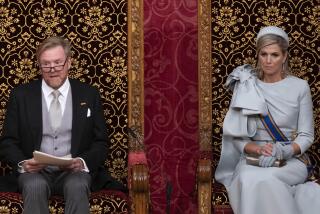Sweeping Reforms : S. Africa Legalizes Mandela’s Party, Will Free Him Soon : De Klerk Says He Plans to Give Vote to Blacks
- Share via
CAPE TOWN, South Africa — In a speech that launched a new era for South Africa, President Frederik W. de Klerk today lifted a 30-year ban on the African National Congress and announced that its jailed figurehead, Nelson R. Mandela, will soon be released.
In his watershed address to Parliament, De Klerk said the ANC and other black nationalist movements will be legalized immediately.
“The season of violence is over. The time for reconstruction and reconciliation has arrived,” he told the white-dominated Parliament’s opening session in a speech setting the scene for a negotiated settlement to South Africa’s political deadlock.
De Klerk said his long-term aim is the formulation of a new constitution that will give the vote to all South Africans, regardless of color, and that will put an end to racial domination.
Education Minister Stoffel van der Merwe said the form of universal franchise would have to be negotiated with black leaders but that it would not let the black majority dominate whites.
De Klerk said his government will decide on a date for Mandela’s release “soon” but added that a short delay is unavoidable.
“I wish to put it plainly that the government has taken a firm decision to release Mr. Mandela unconditionally,” he said.
Government sources said shortly after the announcement that Mandela, jailed for life in 1964 for plotting to overthrow white rule, could be free within a week.
Other measures announced in De Klerk’s speech included a temporary halt to executions, an easing of restrictions on reporting political unrest and a six-month limit to political detention without trial.
De Klerk’s sweeping concessions were greeted cautiously by ANC leaders but with jubilation by thousands of anti-apartheid activists who turned out in the streets of Cape Town and Johannesburg to celebrate.
Mandela’s wife, Winnie, who led a 5,000-strong protest march through Cape Town, said De Klerk had not gone far enough and that apartheid should be scrapped immediately.
“We are not prepared to accept a bone with no meat. Unbanning the ANC and leaving apartheid as it is is no deal,” she told the marchers.
In Harare, a senior ANC official said the movement saw “some substantive changes,” and veteran ANC leader Walter Sisulu told a news conference in Stockholm: “Victory is in sight.”
World reaction was swift and generally positive, with some of the warmest praise coming from British Prime Minister Margaret Thatcher, who said she would invite both De Klerk and Mandela to London for talks.
President Bush welcomed De Klerk’s package, but said further development of the trends in it would be needed before he ends economic sanctions against South Africa. Bush has invited Mandela and De Klerk to Washington.
Even hard-line black African apartheid critics joined in the chorus of praise, although Nigeria, Zambia and Ghana said De Klerk should have done more.
Inside South Africa, moderate black leader Mangosuthu Gatsha Buthelezi, head of the 2-million-strong Zulu Inkatha movement, said De Klerk had now proved he was sincere about apartheid reform.
The news from Cape Town immediately boosted South Africa’s beleaguered economy, and the Johannesburg stock exchange closed sharply higher at record levels.
More to Read
Sign up for Essential California
The most important California stories and recommendations in your inbox every morning.
You may occasionally receive promotional content from the Los Angeles Times.










